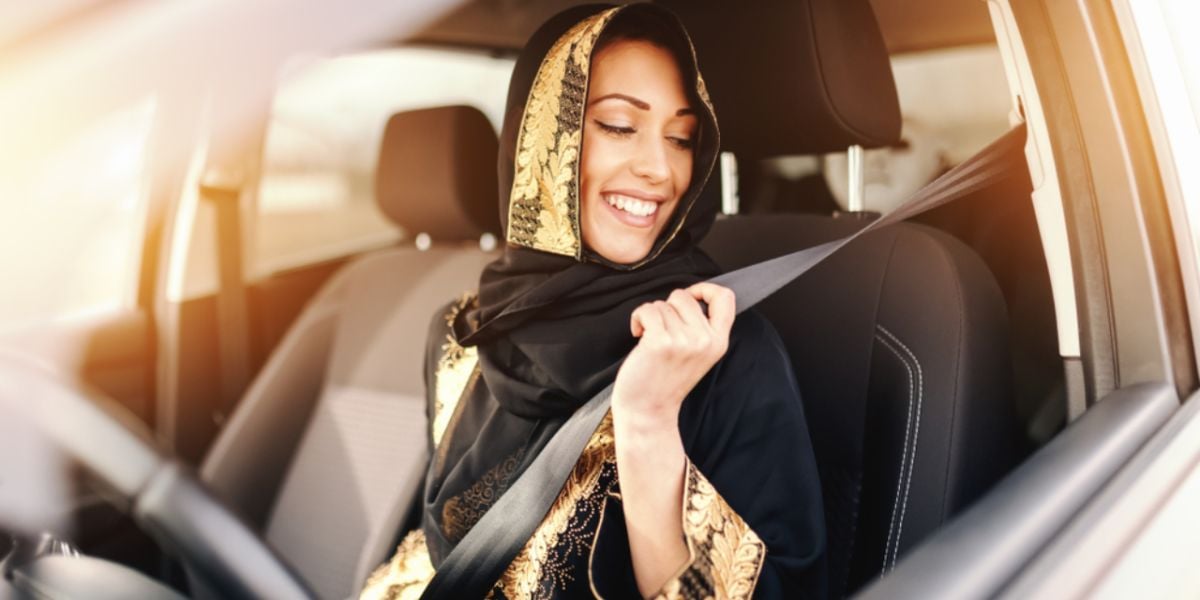
Saudi Arabia can be a challenging destination for women. As a strict Islamic country, Saudi Arabia imposes a lot of restrictions on its citizens - especially women. However, under the current prince of Saudi Arabia, Mohammed bin Salman Al Saud, the country has undergone a lot of changes and modernization. A great number of restrictions that used to guide Saudi Arabia's everyday life have now been lifted, which makes life in the country much easier for expats - and especially expat women.
Recent changes in Saudi Arabia
Women in Saudi Arabia were granted the right to vote only in 2015. Women weren't allowed to drive until 2018, when new legislation was passed allowing Saudi women to obtain a driver's license.
Once, it was a common practice that unrelated men and women couldn't interact in public. Nowadays, men and women can mostly communicate freely in public - as long as there are no public displays of affection involved. Since December 2019, the Ministry of Municipal and Rural Affairs has ended the requirement for restaurants, cashiers and businesses to have separate sections for males and families.
From 1976 to 2016, social and everyday life in Saudi Arabia used to be under the strict watch of the Mutawwa-Hai'a, also known as the Saudi Commission for the Promotion of Virtue and Prevention of Vice (CPVPV), also known as the religious police. Their job was to make sure that Saudi nationals were punctual in their prayers, abided by all the social norms, dressed appropriately - and more. The religious police used to hold a lot of power in the country and were able to detain people for misbehavior. In 2016, the powers of the CPVPV were sharply curtailed. While they still function today, their role is now minor so they are rarely seen. They are unable to detain, question or ask anyone for identification. If there is an offence to be reported, they need to report back to the police for action to be taken.
Despite the positive changes described above, Saudi Arabia remains a rather conservative country. There are still lots of strict rules in place that govern the life of women in the country - including what they should wear and how they should behave. In fact, there are public decency laws in place that dictate just that.
Dress code for women in Saudi Arabia
According to the country's public decency laws, women in Saudi Arabia should dress in a way so that their shoulders and knees are covered. They are no longer required to wear a headscarf or abaya (a black or dark robe worn on top of regular clothing). With that, a lot of women in the country still do wear abayas - and wearing one can make it easier to "fit in" and not call unwanted attention to yourself. It is not legally required for women to cover their head - however, you may be asked to do that (depending on the location and occasion) as a sign of respect.
Compound living in Saudi Arabia
A lot of expats moving to Saudi Arabia prefer to settle in compounds. These are secure gated communities with lots of amenities on site. This often includes swimming pools, fitness centers, convenience stores, coffee shops and even preschools. Inside these compounds, expats can feel more relaxed and keep to the lifestyles they are used to, without a lot of the restrictions imposed outside the compound walls.
Life in a compound can be much easier for expat women moving to the country. First, with lots of amenities within walking distance, running errands becomes a much easier task. Second, socializing can also be much more fulfilling within a compound as there are lots of chances to get to know fellow expats and exchange experiences and advice on life in Saudi Arabia. Moreover, as we've mentioned above, there are much fewer everyday restrictions to worry about inside the compound walls: women can generally wear what they want, interact freely with the opposite sex, and more.
While compound life may not give you the "authentic" experience of living in Saudi Arabia, it can be very helpful in battling the initial culture shock and make your life in the country much more eventful and much less isolated.
Family life and marriage in Saudi Arabia
There is no family law in the country, and family relations such as marriage, divorce and child custody are governed by Sharia law.
Saudi women need the permission of their male guardian (father, brother, etc.) to get married or divorced. Until 2019, divorce was a one-way process, and Saudi women didn't even have the legal right to be notified if their husbands chose to file for divorce. As a result, many women were left without their alimony rights. In 2019, a new law was passed that made it impossible for men to divorce their wives without their knowledge.
Child custody is a complicated issue in Saudi Arabia.
Important:
The Kingdom of Saudi Arabia is not a party member of the Hague Convention on the Civil Aspects of International Child Abduction. It also doesn't have international or bilateral treaties in place with most countries related to international parental child abduction. Citizens of other countries traveling to Saudi Arabia remain in the jurisdiction of Saudi courts and the laws and regulations of Saudi Arabia during their stay - which is also true for matters such as child custody. If you are a parent considering a trip to Saudi Arabia, make sure you take this into consideration.
As mentioned earlier, child custody (as well as most other family-related disputes) is governed by Sharia law. Thus, the main concern of a Saudi court in child custody cases is that the child must be raised in accordance with the Islamic faith. Because of this, full custody is rarely granted to non-Saudi women. If the woman is an Arab Muslim, judges will generally only grant her custody of her children if she is permanently residing in Saudi Arabia or if the father is a non-Muslim.
When it comes to handling child custody cases of non-Muslims, Saudi courts will often refer these to family courts in the countries where the parents are from. As Saudi courts prefer not to get involved in complicated international custody cases, they may have the family in question deported from the country to avoid associated legal complications.
Typically, under Sharia law, a mother can keep custody of her male children until the age of nine and her female children until the age of seven. However, Sharia court judges have broad discretion in custody cases and often make exceptions to these general guidelines.
Note that even if the child's mother is permanently residing in Saudi Arabia and is, thus, granted physical custody of her child or children, the father will maintain legal custody and have the right to determine where the children live and travel.
There are also a number of conditions under which the mother can lose custody of her children. For example, if the mother moves to another country, the father will take over the custody. The mother can also lose custody if she remarries a non-Muslim or if she resides in a home with non-relatives. Additionally, the court can take away the mother's custody rights if it deems the mother incapable of caring for her child or raising them in accordance with Islamic standards.
Under Sharia law, in the case of the death or absence of the father, the custody of children will be awarded to the closest male relative of a Saudi father. This is standard practice when it comes to child custody in the country and will be the chosen course of action - even if the father made it clear that his wish was for the children to remain with their mother.
Healthcare for women in Saudi Arabia
Navigating the healthcare system in Saudi Arabia may seem challenging at first - but with a bit of research, you'll discover that most services are easily accessible through private hospitals. With that, there are a number of important restrictions that you should be aware of.
You can purchase most forms of contraception in Saudi Arabia - however, in some pharmacies, you may be asked for a marriage certificate as sex outside of marriage is still illegal in the Kingdom. In most big cities (like Riyadh and Jeddah), you generally won't be asked for a marriage certificate. If you want to be on the safe side, you can get your doctor to give you a prescription for a type of contraceptive pill.
Emergency contraception (the morning after pill) is available only with a prescription. This may be complicated by the fact that few doctors will feel comfortable prescribing it.
Abortion is only allowed in very specific cases in Saudi Arabia.
In order to access maternity services in Saudi Arabia, you need to be legally married. This means that even at your first appointment to confirm the pregnancy, you will need to present a marriage certificate. If you are pregnant but not legally married, it is strongly advised that you leave Saudi Arabia and have your baby abroad.
Other than the limitations above, you should have access to a full range of medical services in Saudi Arabia, including maternity and childcare. The services included in your maternity plan depend on the type of insurance you have. Some health insurance plans include additional services like prenatal and postnatal classes.
Women in business and the workplace in Saudi Arabia
Just a few years ago, women played a very limited role in the economy of Saudi Arabia. However, as part of Saudi Vision 2030 under Crown Prince Mohammed bin Salman, women are encouraged to take up more initiatives in the workplace as well as the country's economy in general. With the new policy, as of 2023, more than one in three Saudi employees were female. This number has already exceeded the goal at the onset of the plan for Saudi Vision 2030, which was to be at least 30% by 2030.
In the business world, Saudi women currently account for close to 40% of all registered entrepreneurs.
As can be seen from the above, women's involvement in the economy is growing. However, there are still notable challenges to overcome. One of them is a substantial pay gap, with women making over 50% less than men in the same positions.
Despite the new policy's and the country's overall opening, doing business in Saudi Arabia as a foreign woman can be quite challenging. Several years ago, women couldn't even travel to the country unaccompanied by men. Moreover, most restaurants and coffee shops used to have separate entrances and sitting areas for men and women. Many of these restrictions are now being lifted - however, it may take longer for attitudes to change.
If you need to travel to Saudi Arabia for business, you may find it easier to travel with a male colleague or a local partner. When introduced to local business associates, do your best to establish your rank and hierarchy instantly: you can do this by emphasizing your job title and professional qualifications.
Note that building lasting business relationships will also be harder for businesswomen compared to businessmen in Saudi Arabia. For example, women won't be able to invite their male business partners for lunch meetings (unless as part of a larger group) and socializing outside of the office will also be problematic.
Women are legally allowed to work in Saudi Arabia. However, specific criteria have to be met.
Since 2019, Saudi women do not need their legal guardian's approval to take up work anymore.
Women are not allowed to work in hazardous industries like construction, mining, etc.
Women are allowed to work alongside men. However, once again, there are certain conditions. For instance, the office needs to be equipped with separate bathrooms for men and women. There should be a security system in place as well as private lunch and prayer areas for men and women. Naturally, these demands can be quite pricey for companies to fulfill - which is why a lot of businesses are rather reluctant to hire women.
Overall, adjusting to life in Saudi Arabia as a woman can be complicated. There are a lot of rules and regulations to follow, on both official and social levels. Expat women moving to Saudi Arabia are advised to research the topic on expat forums and make all the arrangements necessary to make their life in the country easier.
We do our best to provide accurate and up to date information. However, if you have noticed any inaccuracies in this article, please let us know in the comments section below.








